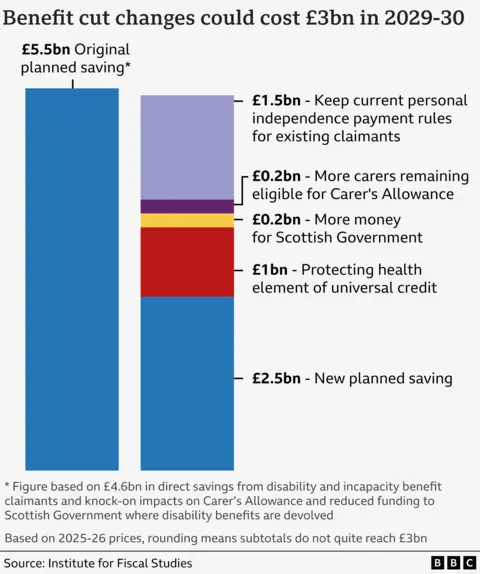We've got the right balance, says PM after benefits U-turn
 PA Media
PA MediaSir Keir Starmer has said his welfare reforms strike "the right balance" after making concessions to his own backbench MPs.
The government's initial plans, aimed at bringing down the welfare bill, would have made it harder for people to claim personal independence payment (Pip), a benefit paid to 3.7 million people with long-term physical or mental health conditions.
However, faced with a growing rebellion from Labour MPs and a likely defeat in the Commons, the government announced the stricter criteria would only apply to new claimants.
"We've talked to colleagues who made healthy representations as a result of which we've got a package which I think will work," he said.
As part of its climbdown, the government has reversed its plans to freeze the health-related component of universal credit. The payment will now rise in line with inflation for existing recipients.
Ministers will also carry out a review of the Pip assessment process, with input from disability organisations.
A £1bn support package to help people into work, originally scheduled for 2029, will be fast-tracked.
Speaking to broadcasters, Sir Keir said: "We need to get it right that's why we've been talking to colleagues and having a constructive discussion.
"We've now arrived at a package that delivers on the principles with some adjustments and that's the right reform and I'm really pleased now that we're able to take this forward."
The government faced growing discontent from around 120 of its own MPs over the changes.
While the rebels told the BBC their colleagues are happy with the concessions, some Labour MPs have said they will still vote against the proposals.
The size of that rebellion is not yet clear, although it is thought some 50 Labour MPs could still vote against the bill, and there would be several abstentions.
It would take 83 Labour backbenchers - along with the other opposition parties - to defeat the government.
Dame Meg Hillier, who had led attempts to block the plans, told the BBC ministers had introduced "reassuring measures", and that she would be backing the government.
Fellow Labour MP Debbie Abrahams, who chairs the Work and Pensions Committee, told the BBC that the concessions "are a good start" but there were still concerns about new claimants.
She said: "We think lessons had been learned, and I'm sure they will continue to be learned over the weekend.
"There have been harms, people have died in previous changes in eligibility criteria. It would not be right for me not to do anything just to spare the prime minister an inconvenience.
"It had to be raised and we did it as quietly and professionally as we could, using the levers that government has, and parliament has, and we know the message has been heard."
A number of MPs have also said they don't believe the changes go far enough.
For some, the concerns they have focus on the cuts that ministers want to make to disability benefits.
For others, this row is the latest example of frustrations about a perceived lack of engagement between Number 10 and backbenchers who are seen to be out of favour.
Another Labour MP, who is still planning to vote against the government, said the views of some rebels were being viewed as "more important than others", which they said "in itself is a huge problem".
Some backbench Labour MPs have concerns that the new proposals will treat people with the same conditions differently, depending on whether they are existing or new claimants.
The BBC has been told some have sought legal advice over whether the creation of a "two-tier" system would be allowed.
The prime minister's spokesperson declined to say if the government had sought similar legal advice but stressed that it wasn't unusual to have different sets of rules for different benefit claimants.
The government originally hoped to save £5bn a year by 2030 with its Universal Credit and Personal Independence Payment Bill, aiming to slow the rise in claimants.
Working-age health-related benefits are estimated to cost an extra £30bn by 2029 without reforms.
The Institute for Fiscal Studies and Resolution Foundation think tanks have estimated the government's U-turn could cost £3bn, meaning Chancellor Rachel Reeves will either have to increase taxes, cut spending elsewhere or borrow more if she is to meet her self-imposed spending rules.
The PM's spokesman said the "changes will be fully-funded, there'll be no permanent increases to borrowing", but did not rule out a temporary rise.

Abdi Mohamed from the disability charity Scope welcomed the government's concessions but said the measures should be paused until the review into Pip assessments had been concluded.
Labour MP for North Somerset Sadik Al-Hassan said he was accepting the compromises, telling the BBC's World at One he believed the promised review would make the Pip scoring system "significantly better".
"There are always going to be some of my colleagues who are going to want to push this to destruction but I'm a firm believe that you can't always get everything you want," he added.
However, speaking to the same programme, Cat Eccles - Labour MP for Stourbridge - said the government's offer was "too little, too late".
Conservative leader Kemi Badenoch said the concessions were "the worst of all worlds".
She accused the government of "floundering", adding: "I don't see how they're going to be able to deliver any of the things they promised if they can't do something as basic as reducing an increase in spending."
The Liberal Democrat's Tim Farron said that under the new plans "if you currently have a condition like Parkinsons or MS then you will get support to wash and cook for yourself - but someone diagnosed next year gets nothing."
"This is just utterly appalling."
Richard Tice, deputy leader of Reform UK, said: "The welfare bill must be cut before it spirals out of control, but Starmer is playing party politics with the public finances."
The Green Party said the changes would "create an unjust two-tier benefits system".
